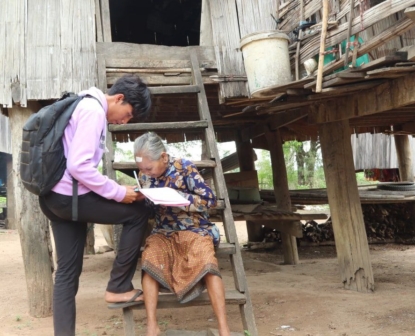Project
Indigenous Voices
-
Amount Funded
49,159 EUROProject Duration
01 Oct 2021 - 30 Sep 2023 -
-
Lead organisation
Conserve Indigenous Peoples Language Organization (CIPL)
-
Conserve Indigenous Peoples Language Organization (CIPL) is a Non-Government Organization that was established in 2016 and registered with MoI in 2017. CIPL is an indigenous-led organization, one of its key aims is to ensure indigenous community leadership and ownership of communication and media activities. The priorities and activities of Conserve Indigenous Peoples Language Organization will be shaped and guided by the indigenous communities that it supports. CIPL has an important and unique role in Cambodia in strengthening indigenous peoples’ access to information in remote parts of Cambodia and in their own languages. It has a role in strengthening indigenous voices on matters impacting indigenous rights, livelihoods, and culture: namely the loss of indigenous lands through illegal land grabbing and the Government#s granting of economic land concessions on indigenous homelands. The organization’s goal is to see indigenous youth have the capacity to produce and use high-quality media with the participation and encouragement of their elders. They use media to raise awareness of important issues to their communities and relevant stakeholders. Vision: Indigenous people live peacefully, with prosperity, freedom, and dignity. Mission: indigenous peoples especially in Ratanakiri province have access to information, knowledge, cultural identity and rights important to communities by working in collaboration with them and other relevant stakeholders, to provide communication and media in indigenous languages.
-
Organisation
Conserve Indigenous Peoples Language Organization (CIPL) is a Non-Government Organization that was established in 2016 and registered with MoI in 2017. CIPL is an indigenous-led organization, one of its key aims is to ensure indigenous community leadership and ownership of communication and media activities. The priorities and activities of Conserve Indigenous Peoples Language Organization will be shaped and guided by the indigenous communities that it supports. CIPL has an important and unique role in Cambodia in strengthening indigenous peoples’ access to information in remote parts of Cambodia and in their own languages. It has a role in strengthening indigenous voices on matters impacting indigenous rights, livelihoods, and culture: namely the loss of indigenous lands through illegal land grabbing and the Government#s granting of economic land concessions on indigenous homelands. The organization’s goal is to see indigenous youth have the capacity to produce and use high-quality media with the participation and encouragement of their elders. They use media to raise awareness of important issues to their communities and relevant stakeholders. Vision: Indigenous people live peacefully, with prosperity, freedom, and dignity. Mission: indigenous peoples especially in Ratanakiri province have access to information, knowledge, cultural identity and rights important to communities by working in collaboration with them and other relevant stakeholders, to provide communication and media in indigenous languages.
-
Project
With proper consultative and reflection from the previous project funded by Voice phase I, this “Indigenous Voices” project is aimed to strengthen the capacity of indigenous peoples and minority groups able to raise their voices, demanding their rights to access social services, resources, and space for political participation. It’s intended to see indigenous youth, poor widows and people with disabilities have stronger voices to influence local authority and government to address their common needs and issues. In order to achieve this, CIPL has proposed some intervention approaches with project goals and objectives as below: Main objective: Indigenous people and minority groups (poor widows and people with disabilities) have the opportunity and empowered to express their voices to participate in democratic development and political space through promoting and demanding their rights in access to social services. Specific objective 1: Active sharing of indigenous community information through multi and innovative media by young indigenous people. Specific objective 2: Indigenous community including elderly, women, widows, people with disabilities and youth have better access to information to gain knowledge on their rights to participate in democratic development, political space, and social services in their local language. Specific objective 3: Both target community centres are able to generate income to support the centre through ecotourism and other social enterprise concepts. Specific objective 4: Poor widows and people with disabilities are empowered and confident to raise their voices and promote dialogue with local authorities in demanding their needs and issues to be addressed. This 24 months project is expected to cover 2 different communities of Ratanakiri province.
-
-
With proper consultative and reflection from the previous project funded by Voice phase I, this “Indigenous Voices” project is aimed to strengthen the capacity of indigenous peoples and minority groups able to raise their voices, demanding their rights to access social services, resources, and space for political participation. It’s intended to see indigenous youth, poor widows and people with disabilities have stronger voices to influence local authority and government to address their common needs and issues. In order to achieve this, CIPL has proposed some intervention approaches with project goals and objectives as below: Main objective: Indigenous people and minority groups (poor widows and people with disabilities) have the opportunity and empowered to express their voices to participate in democratic development and political space through promoting and demanding their rights in access to social services. Specific objective 1: Active sharing of indigenous community information through multi and innovative media by young indigenous people. Specific objective 2: Indigenous community including elderly, women, widows, people with disabilities and youth have better access to information to gain knowledge on their rights to participate in democratic development, political space, and social services in their local language. Specific objective 3: Both target community centres are able to generate income to support the centre through ecotourism and other social enterprise concepts. Specific objective 4: Poor widows and people with disabilities are empowered and confident to raise their voices and promote dialogue with local authorities in demanding their needs and issues to be addressed. This 24 months project is expected to cover 2 different communities of Ratanakiri province.
-
News



